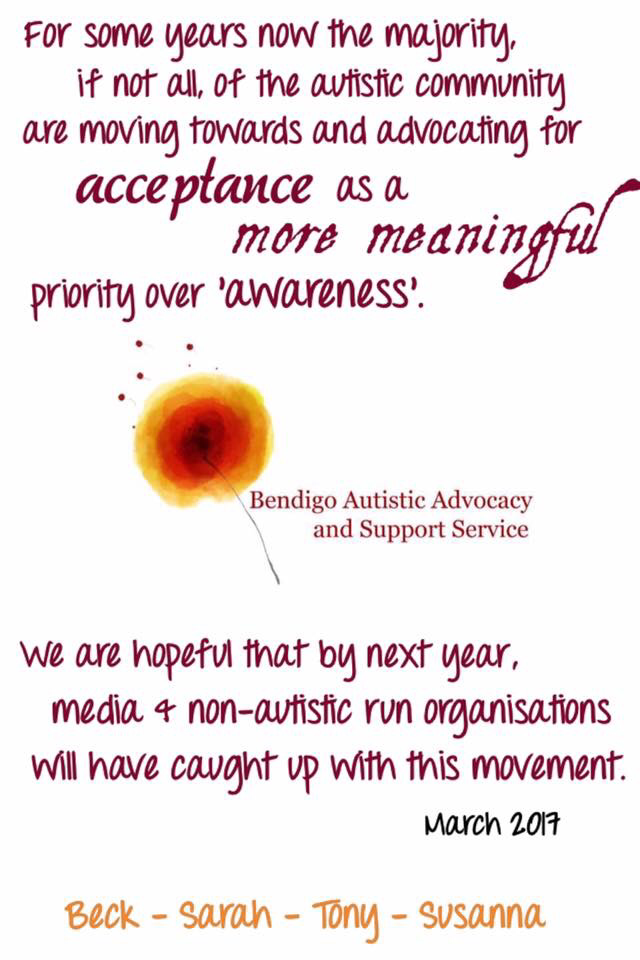Bendigo Autistic Advocacy and Support Service
Menu
Informative Links
BAASS developed resources
- Behaviour plans/charts
| behaviour-plans_charts.pdf | |
| File Size: | 523 kb |
| File Type: | |
- Inclusive Classrooms for Autistic children/youth/adults
| inclusive_classrooms.pdf | |
| File Size: | 685 kb |
| File Type: | |
- Autism & Meltdowns
| autism___meltdowns.pdf | |
| File Size: | 540 kb |
| File Type: | |
Informative Links
Some great 'need to know' topics and links.
To read some of our favourite writings on different topics, please browse through the links below.
Click on the text to be redirected to the articles.
The headings on this page:
Terminology
Identity First Language
'Special Needs' & 'Ability'
Function Labels
More Important Topics
Socialisation and Autism
Sharing Information about Autistic Adults and Children Respectfully.
What is the Social Model of Disability?
Why is 'Autism Awareness Month' hard for Autistic People and why 'Acceptance' vs 'Awareness?
Supports
School & Education
Some of our Favourite Sources of Information
Autistic Resources
In line with BAASS Values, we respect and acknowledge personal choice whilst remaining true to our values.
We reject pathologising and medicalisation of autism and embrace the neurodiversity paradigm.
We will remain transparent and practice in accordance with probity and commitment to ongoing evolution in knowledge and practice.
- We do not use or support the term 'disorder' in relation to autism which includes the use of 'ASD' in which the 'D' stands for 'disorder'
- We do not use or support function labels (high and low functioning) as these are inaccurate and harmful for autistic people
- We use identity first language as is preferred by the majority of the adult autistic community, and always respect each person's preferences.
You can also find more information on our 'New to Diagnosis' page here.
Language matters. A lot.
Identity First Language, being autistic and labels.
- Identity First Autistic, view here.
- Identity First Language- ASAN (Autistic Self Advocacy Network) & Autistic Hoya, view here.
- Actually, I Do Let Autism Define Me: Identity-First Language- THE AUTISTINQUISITOR, view here.
- Autism does define me - Michelle Sutton, view here.
'Special Needs' and 'Ability'
The majority of the autistic and disability community avoid terminology around 'special needs' and replacing disability with varying forms of 'ability'. Find some links to great writing and resources for further information around this.
The majority of the autistic and disability community avoid terminology around 'special needs' and replacing disability with varying forms of 'ability'. Find some links to great writing and resources for further information around this.
- Human Needs, Not 'Special Needs'. Down Syndrome International, Coordown, Down Syndrome Australia, Foundation Jerome Lejeune, Down's Syndrome Association -View here.
- #Not 'Special Needs', Just Human Needs. Not Special Needs.Com -View here.
- My needs aren't 'special'. Michelle Sutton at Michelle Sutton Writes -View here.
- “He ain’t special, he’s my brother” – Time to ditch the phrase “special needs”. Starting with Julius -View here.
- #Say the word, not "special needs". Erin Human at The E is for Erin. View here.
- This is why we must stop searching for ways to say 'special needs'. Disability Africa -View here.
Function Labels
- Face the truth: what you REALLY mean when you say “low-functioning”-Morénike at Respectfully Connected. Available here.
- Decoding the high functioning label. Cynthia Kim at Musings of an Aspie. Available here.
- More problems with functioning labels. Amy Sequenzia at Ollibean. Available here.
- Functioning labels, again. Amy Sequenzia at Autism Women's Network. Available here.
- 'Function labels'. Identity-First Autistic. Available here.
Socialisation and Autism
- Socialisation and Autistic Children. Briannon Lee at Respectfully Connected -View here.
- It's ok to say 'no' to socialising. Briannon Lee at Respectfully Connected. View here.
- Social Skills for everyone. Erin Human. View the infographic here.
Sharing of information about autistic adults and children respectfully
- Media guidelines for stories involving autistic children and adults. Autistic Families International. View guidelines here.
- Share more real parenting. Racheous. Article can be viewed here.
What is the social model of disability?
- Disability 101: Social Model. Erin Human. Infographic available here.
Why is 'Autism Awareness Month' hard for autistic people
and why 'acceptance' vs 'awareness'?
and why 'acceptance' vs 'awareness'?
- Autism Awareness vs. Autism Acceptance. Michelle Sutton. Article and infographic can be found here.
- Autism Awareness. Judy Endow at Olliebean. Available here.
- Blue Lights Won't Help Me. Michelle Sutton. Available here.
- Acceptance vs Awareness. Kassiane S at Autistic Self Advocacy Network. Article available here.
- Why Acceptance? Richard Davis at Thinking Person's Guide to Autism. Available here.
Blue Lights Won't Help Me. Michelle Sutton. Available here.
|
Supports
More information can also be accessed on our 'Supports' page here. This page includes links to information, options and eligibility for funding and financial supports and more. |
- Autistic Families International
Autistic Family Collective is a group of Australian autistic advocates working to contribute to the neurodiversity movement, " providing a collective platform to amplify autistic perspectives in advocacy for civil rights, respect and equality." AFC provides a wealth of information and resources.
Visit AFI here.
Visit AFI here.
- Respectfully Connected
Journeys in Parenting and Neurodivergence, aiming to empower families and provide relevant and respectful information. Visit the website here.
- Parenting Autistic Children with Love and Acceptance
This is a space to give a sense of community to parents that choose to parent Autistic children with love and acceptance. In this space, parents are encouraged to discuss supporting and accommodating Autistic children respectfully, advocating for neurodiversity, and the bountiful joys of raising Autistic children. Visit PACLA here.






